Angel Rae Miller is continuing a family legacy of success as a horse trainer and competitor.
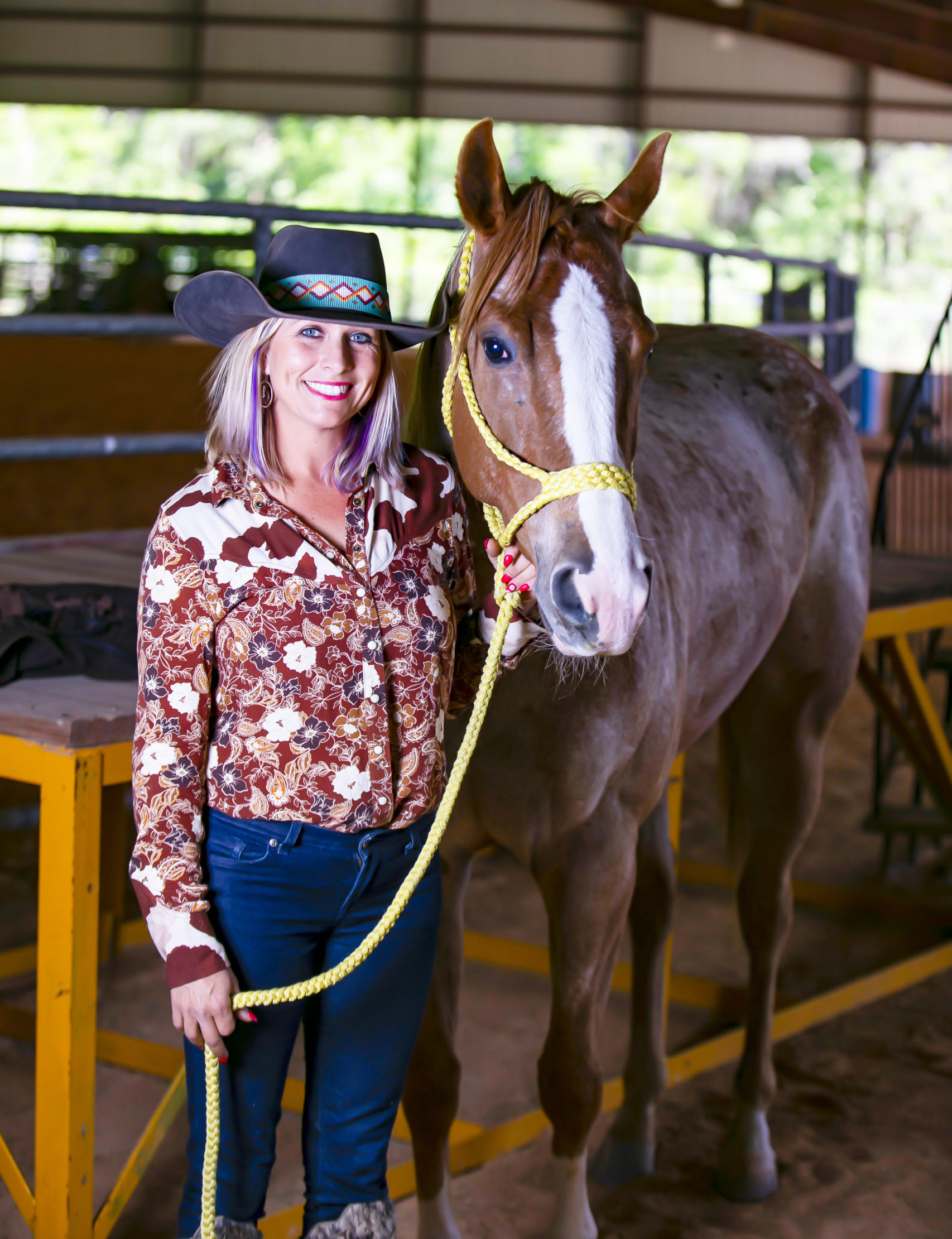
There may be 200 people in the arena stands, or 2,000, but they fade into the background as Angel Rae Miller’s horse prances into the staging area, twisting and turning and stirring up a cloud of dust. Miller focuses inwardly, silently or softly singing snippets from a worship song or other favorite to calm her busy mind. When it’s time to go barrel racing, she guides the horse into position and the duo bursts forward with what she calls “all guns a-blazin’.”
That was the scenario several times for Miller and her mounts during the recent PacWest Barrel Racing event at the Southeastern Livestock Pavilion in Ocala. The racing organization is run by Phyllis Torturo of Ocala and her daughter Nicole Torturo of Norman, Oklahoma. The April show was the first of five in the current series, which will wrap up in February 2023.
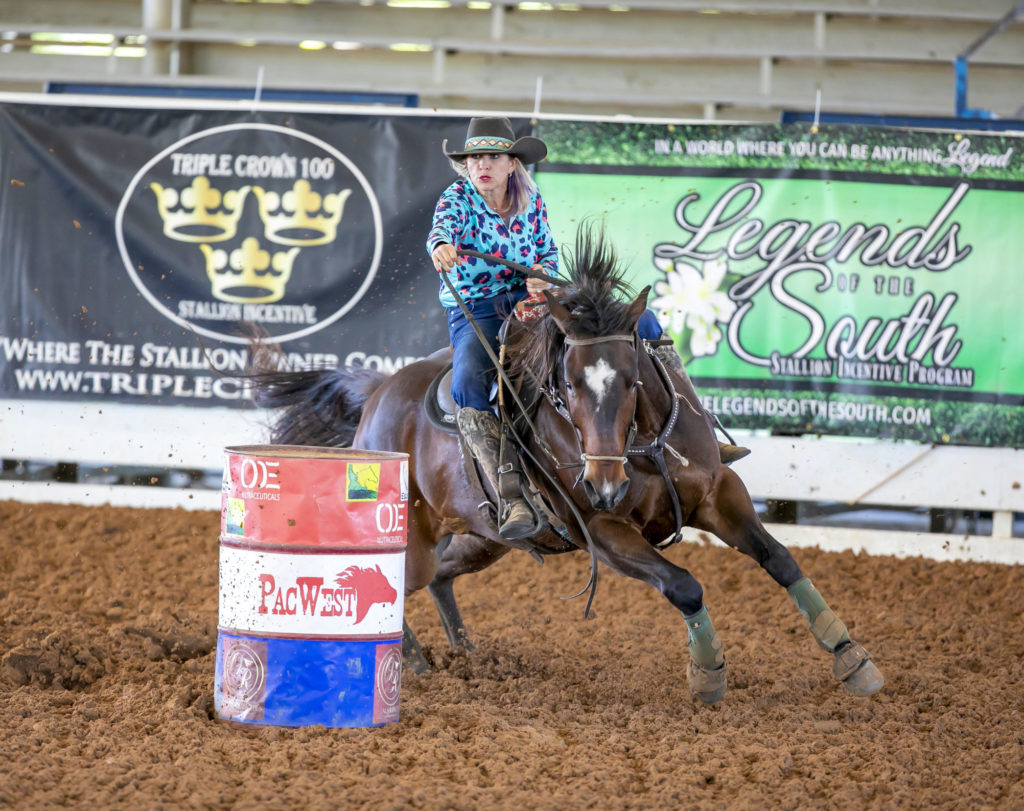
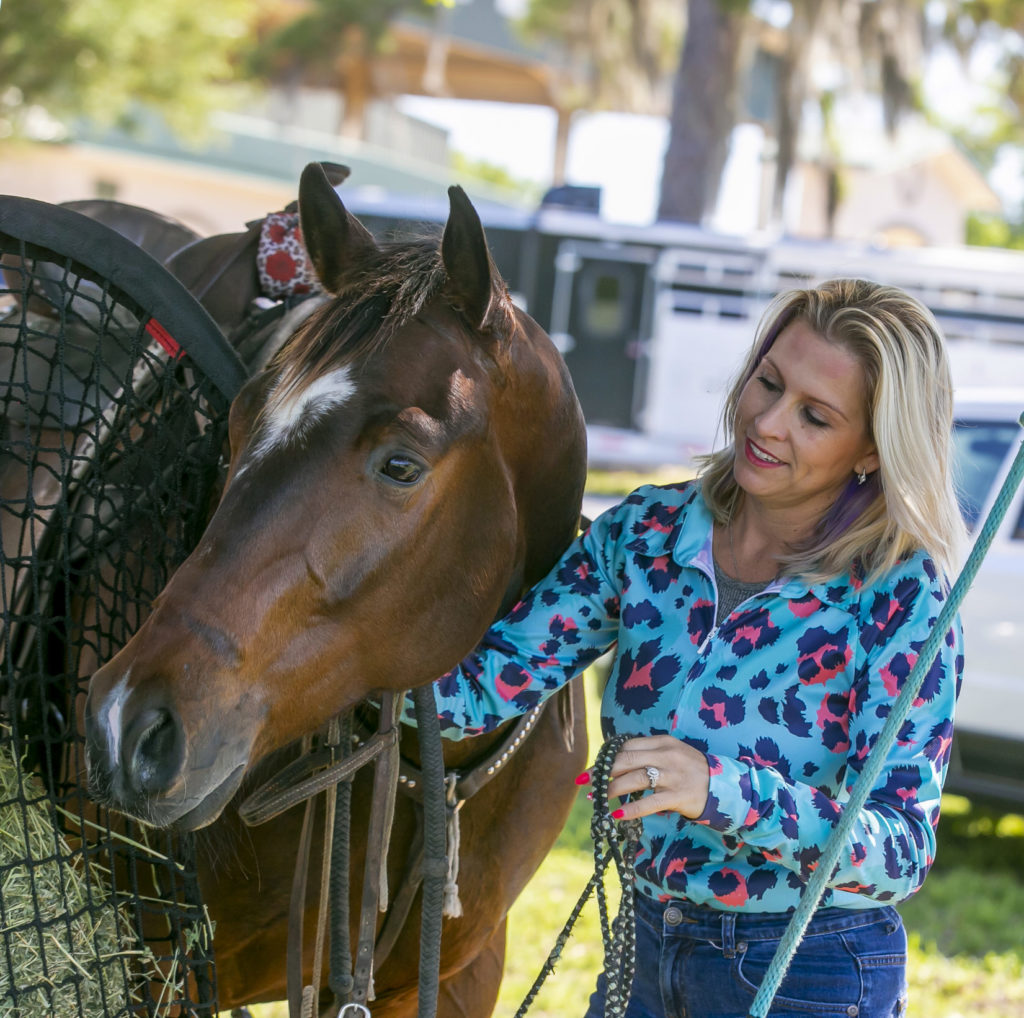
Miller was born and raised in Davie, in south Florida. She comes from an extended family of cowboy and cowgirl world champions and halls of fame members, including her father, Norman Edwards; aunt, Darlene Fletcher; and uncle, Mike Fletcher. She says the first time she was on a horse was the day her mom, Phyllis, and her dad brought her home from the hospital and she was cradled in his arms while he was mounted. It wasn’t long before she was competing in classes in cutting, reining, roping and jumping. “But I have always felt the call of barrel racing,” she shares.
Miller’s mom and dad moved their family to Shiloh, in northwest Marion County, about 20 years ago, where they established a campus that includes several homes and barns, her sister Callie Sue Ed-ward’s hair salon and The Church at Triple Cross.
Today, Miller, 37, travels all over the country for top-level barrel racing competitions and consistently is at the top of the scoreboards. In early April, she was listed in fourth place in the nation in earnings this year in the Divisional Southeastern Circuit of the Women’s Professional Rodeo Association. She also is a member of the National Barrel Horse Association and says she enjoys competing with the Better Barrel Races and Barrel Futurities of America organizations as well as in local rodeo events.
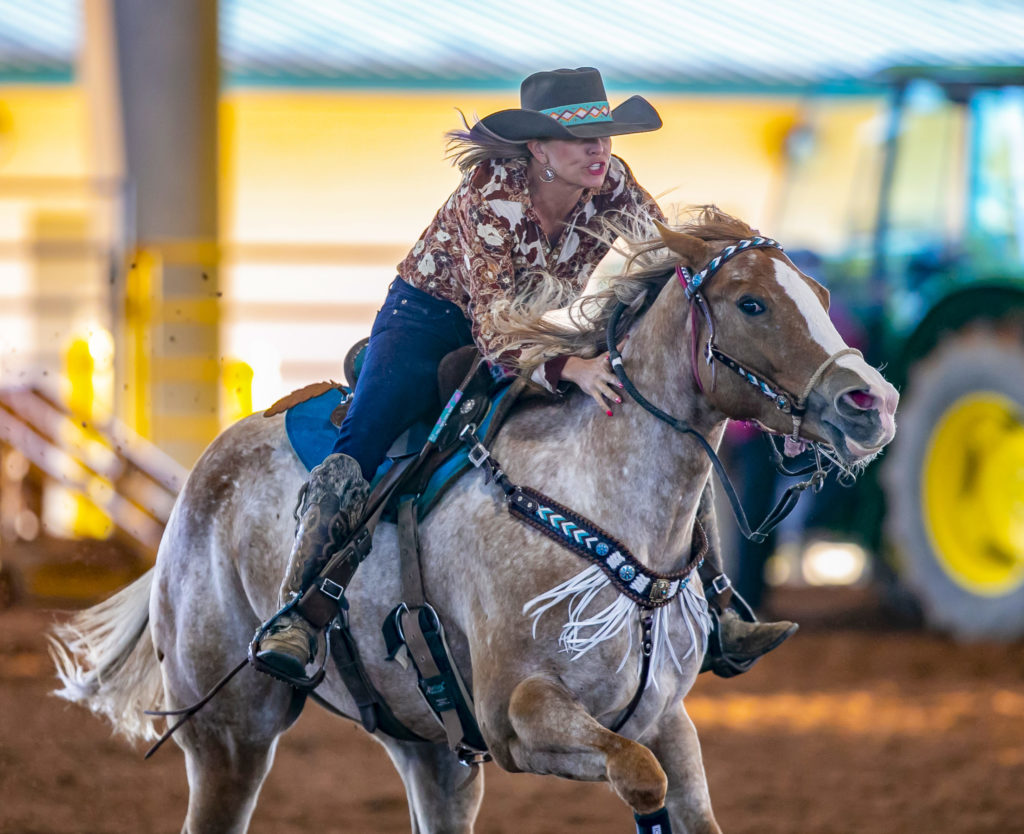
She specializes in training and racing futurity horses, which are those of a younger age. Her company, Fancy Fast Horses, in partnership with her aunt Darlene and friend Anna Acopian, has a presence in Shiloh (oft en referred to as Micanopy), Melbourne, Florida and Quitman, Texas.
“I’ve been to the Pro Rodeo Southeastern Circuit Finals several times and barrel racing for rodeo, which is part of the Professional Cowboy Association,” Miller offers. “Rodeoing is fun and great, but I really love riding the baby horses and training and working with people to better connect with their horses. Basically, I’ll train a horse for a year and then compete on it for a year and, depending on its winning status, I may continue to run it, or the owner may decide to ride it. Most of the horses I ride belong to other people.”
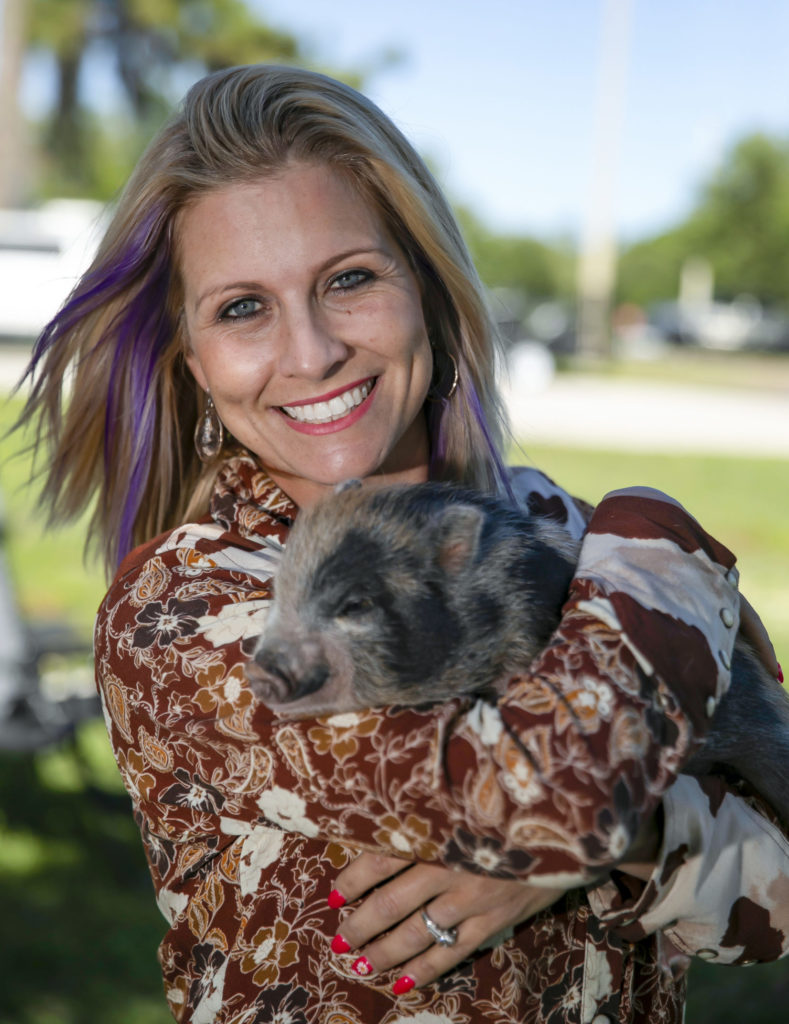
Miller does have her own equines, including her “best horse,” Mother Of All Dragons.
“I competed on her full sibling a few years ago and won quite a bit of money on her all over the country and when Dragon came available, I just couldn’t stop myself,” she shares. “She’s a wild one, so one of my good friends named her a wild name.”
Miller says many barrel racing horses are quarter horses, though some have “a little thorough-bred mixed in there. Dragon is an Appaloosa and is about 80 percent running quarter horse.”
Barrel racing pits the horse and rider against a time clock and they must complete a cloverleaf pattern that uses three barrels. There are penalties for knocking down a barrel. The racing divisions can range from open classes to age groups such as Pee Wees for the younger set and Masters for more mature riders.
Miller says riders must make adjustments based on the arena in which they are competing.
“Every single arena and every single pattern is different,” she notes, “based on the association and how they measure, not from each barrel, but from the fence.”
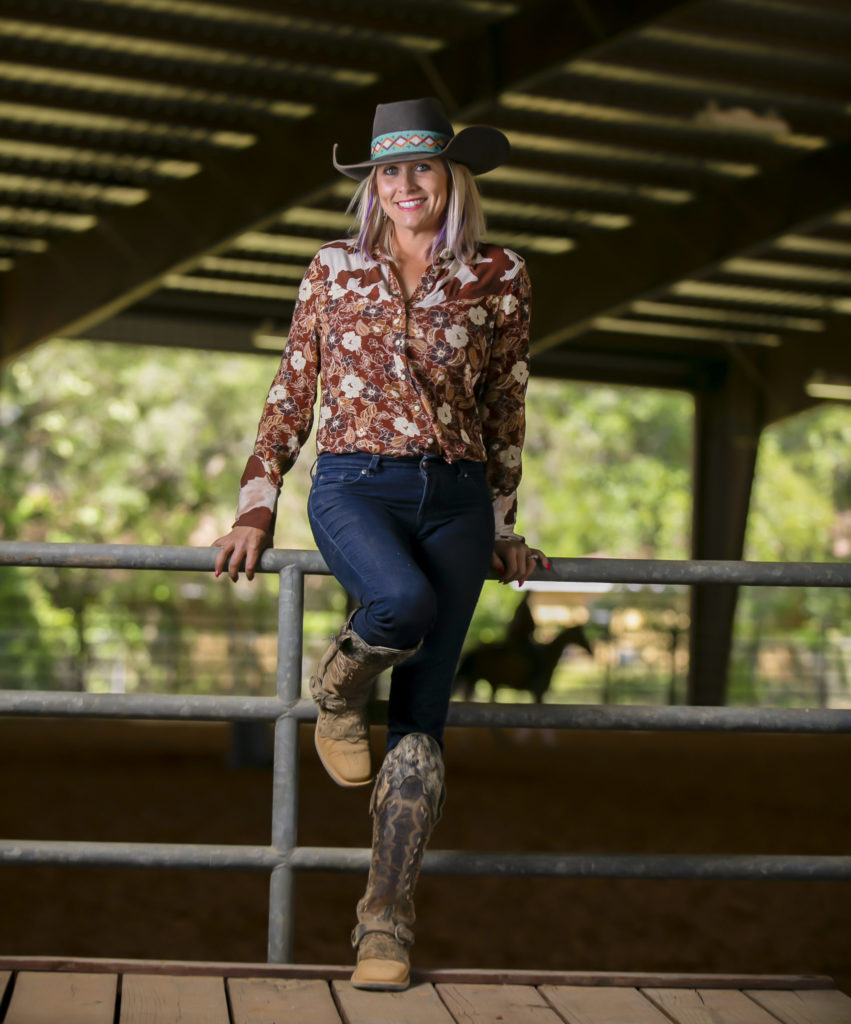
She says when she erupts into an arena, “I just focus on getting to my first spot and doing my job, getting to the next spot and trying not to over-think it, which is very hard to do. You don’t want to overanalyze it too much—you do that when you practice. When you run, you just go. The fastest one wins, so…there you go.”
Callie Sue Edwards says her little sister’s barrel racing career “is so inspiring and influential, and she backs it up with a personality that is attractive and addictive. People naturally want to be around her smiling face and sassy attitude. She has worked so diligently her entire life. She is such a real cowgirl.”
When Miller is on the road, her entourage oft en includes her son, Sean, 6, who brings along his schoolwork, her good friend Robyn Friesen, who helps with the horses and “everything” and “a squirrel, a mini pig and two dogs.” Miller’s husband, Chris, owns a trucking company.
Over the years, Miller has had her share of spills and injuries but says she still loves the rush of adrenaline when competing and the feeling of success when she helps an owner develop a bond with a horse.
“You’ve got to learn a horse’s personality and sometimes it takes a minute,” she says. “You want a happy medium of proper discipline and proper reward, and a lot of times it gets very jumbled. You have to realize that the horse can feel it when a fl y lands on it so if they can understand that and feel that, just the slightest movement of your body, even your hand, changes your posture and position.
“No matter the discipline,” she adds, “whether its cutting horses or reining horses, they are all very similar as far as the less you do to have to force them to do it, it will be better and faster.”
Phyllis Torturo, who says Miller is at “the top of the food chain” as a competitor, notes that they had more than 400 racers each day of the April 8th through 10th event. The grounds of the livestock pavilion were packed with horse trailers and RVs. Vendors under one side of the massive grandstands offered goods ranging from “a $10 piece of jewelry to a $10,000 saddle.”
“This is an excellent facility and it’s very horse-friendly,” Torturo offers. “It’s a very homey feeling to this facility and we’re proud of that. We love putting on events here.”
The PacWest events are free for spectators. They include male and female contestants, in all age groups. Torturo says they make an extra effort with the Pee Wees because “these little ones are the future.”
And that is something Miller can relate to.
“Pretty much my whole life has revolved around riding,” she recalls. “It was never pushed on me, but I was probably 6 or 7 when I started winning money. I was pretty little.” OS






